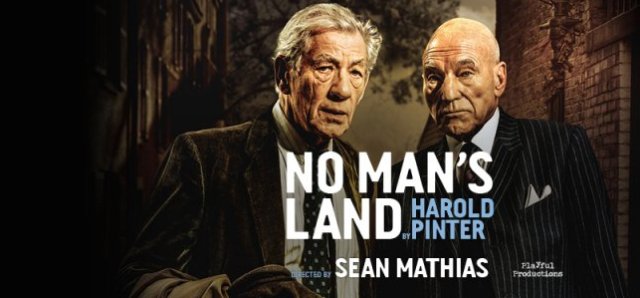NO MAN'S LAND
****
Director: Sean Mathias
Writer: Harold Pinter
Principal Cast:
Ian McKellan
Patrick Stewart
Damien Molony
Owen Teal
Country: UK
Classification: M
Runtime: 150 mins
Australian release date: 4 February 2107
Previewed at: Dendy Opera Quays, Sydney, on 23 January 2017.
Harold Pinter’s play No Man’s Land was performed in London’s Wyndham’s Theatre in 1975, the year it was published, and was recently reprised in the same venue after a successful Broadway season and an extensive tour of England. Now it’s our turn to savour this theatrical puzzle.
This filmed production is the latest broadcast of the National Theatre Live series and it comes with a very entertaining 20-minute post-show Q&A where the cast and the director, Sean Mathias, share their insights into Pinter’s ambiguous work. In it, Ian McKellen expresses his appreciation for the play’s audience, whose response, he claims, is integral to the actors’ performances, a point not often made. Only a few years before its inaugural outing, the open use of the ‘c word’ would have shut down the production but fortunately the Theatres Act of 1968 effectively abolished censorship of theatre productions in the UK. In the Q&A, both McKellen and Patrick Stewart discuss audience reactions to this use of crude language and how it varies depending on where they’re performing the play. It’s a theatrical work which is deceptively simple at face value, yet increasingly perplexing, at times hilarious but with a bitter heart. Indeed, No Man’s Land has been deemed by some as incomprehensible, for its true meaning is maddeningly obscure.
After a boozy session at a local pub, Spooner (McKellen), an unsuccessful, verbose, down-trodden poet, is invited home to a mansion in Hampstead owned by alcoholic upper-class litterateur, Hirst (Stewart), to carry on imbibing. They retire to a sparsely furnished room with a fully-stocked bar as its centrepiece. There the pair, well into their sixties, discuss their lives and careers and the conversation swings between issues of wealth and poverty, strength and vulnerability, and women and relationships, and a battle develops as the men play power games that exhibit both resignation and resistance while grappling with memory and desire. The entrance of a couple of dodgy characters, Foster (Damien Molony) and Briggs (Owen Teale), who seem to be Hirst’s employees, creates a slightly homoerotic atmosphere which scrambles this literary egg even more, a golden egg though it may be.
As Pinter biographer Michael Billington has observed, “The play is about precisely what its title suggests, the sense of being caught up in some mysterious limbo between life and death… [It] is a masterly summation of all the themes that have long obsessed Pinter: the fallibility of memory, the co-existence in one man of brute strength and sensitivity, the ultimate unknowability of women, the notion that all human contact is a battle between who and whom.” It takes the precision performances of the four actors to successfully deliver this complicated and compelling work. No Man’s Land is a play that can, perhaps, never be fully understood but it’s one that will stay with you long after you’ve left the cinema.
